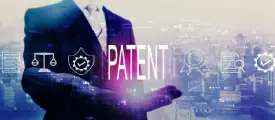By Sakshi Bhatia and Johny Solomon Raj
The Delhi High Court has recently observed that there is a need to re-look Section 3(k) of the Indian Patent Act, 1970, as a large number of inventions in evolving technologies including by SMEs, start-ups and educational institutions could be in the field of business methods or application of computing and digital technologies. Section 3(k) of the Indian Patents Act excludes patentability of inventions relating to mathematical or business methods or computer program per se or algorithms.
For their observation, the court referred to the One Hundred and Sixty-First Report of the “Review of the Intellectual Property Rights Regime in India” presented by the parliamentary standing committee which records as under:
• Presently, the Indian Patents Act, 1970 as well as the Copyright Act, 1957 are not well equipped to facilitate inventorship, authorship and ownership by Artificial Intelligence. As per Section 3(k) of the Indian Patent Act, 1970, a mathematical or a business method or a computer programme or algorithms run by Artificial Intelligence are not patentable. Further, the condition to have a human inventor for innovating computer related inventions (innovations by AI and machine learning) hinders the patenting of AI induced innovations in India. Therefore, there is a need to review the provisions of both the legislations on a priority basis.
• During the deliberations with relevant stakeholders, the Committee was informed that the protection of both AI-generated works and AI solutions should be permitted under patent laws of India as it would incentivize innovation and R&D thereby significantly contributing to creativity and economic growth of the country. It was informed that rendering protection to works generated by AI either autonomously or with the assistance and inputs of a human being would incentivize and encourage the creator of the AI which in turn would further encourage creativity and development of more AI solutions.
• The Committee noted that the relevance and utility of cutting edge technologies such as Artificial Intelligence (AI) and machine learning would increase manifold in the present world especially in the times of Covid-19 pandemic wherein the digital applications are playing a crucial role in responding to the crisis. Moreover, the huge benefits of AI and its applications in India’s revenue generation and economy as well as its impact on technological innovation necessitate its expansion in a secured manner. In view of this, the Committee recommended that a separate category of rights for AI and AI related inventions and solutions should be created for their protection as IPRs. It further recommended that the Department should make efforts in reviewing the existing legislations of The Patents Act, 1970 and Copyright Act, 1957 to incorporate the emerging technologies of AI and AI related inventions in their ambit.
• The Committee was informed that a framework needs to be developed for patenting of algorithms by associating their use to a tangible result. For example, under the AI guidelines of European Patent Office, abstract mathematical methods cannot be patented. However, it can be patented if the mathematical method involves the use of technical means or a device such as computers. Also, linking the mathematical applications and algorithms to practical application makes them a process which could be patented as being practiced in US.
• The Committee recommended to the Department that the approach in linking the mathematical methods or algorithms to a tangible technical device or a practical application should be adopted in India for facilitating their patents as being done in E.U. and U.S. Hence, the conversion of mathematical methods and algorithms to a process in this way would make it easier to protect them as patents.”
Hon’ble Ms. Justice Prathiba M Singh took note of the above report and expressed concern that a large number of inventions may be excluded from patentability in view of Section 3(k).
Brief facts of the case in view of which the above concerns were expressed:
The court made the above observations while dismissing the appeal (https://indiankanoon.org/doc/154732222) moved by Open TV a USA based entity, challenging the order passed by Controller of Patents and Designs on May 31, 2021. The patent application 2564/DELNP/2012 was for a network architecture to enable the exchange of interactive media content distribution of any type of digital or tangible media. The application was therefore rejected by the Indian Patent Office on the ground that the scope of the patent fell within Section 3(k) of the Act and hence, was not patentable. Denying relief to the entity the court said that the exclusion in respect of business methods in section 3(k) is absolute and not restricted by the words ‘per se’ as in the case of computer programs. “In case of computer programs, the use of the phrase ‘per se’ in effect means that a program per se is not patentable but when the same exhibits a technical effect or an advancement, or a technical contribution, the invention could become patentable,” the court said.
Conclusion:
Although the court dismissed the above case without providing any relief to the entity, it made the above observation referring to One Hundred and Sixty First Report of the “Review of the Intellectual Property Rights Regime in India”. In view of the observations, the court directed the Registry to send copy of the present order to the Secretary, Department for Promotion of Industry and Internal Trade (DPIIT), Ministry of Commerce and Industry for necessary consideration.
Related Posts
Ground for rejection of Patent divisional application: Section 16 Controversy


